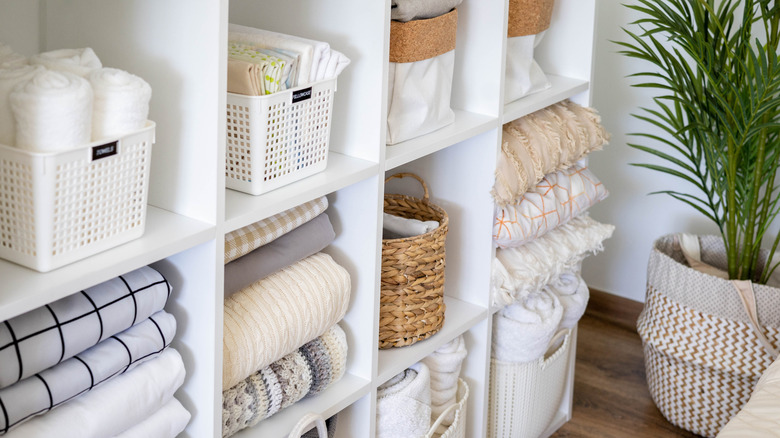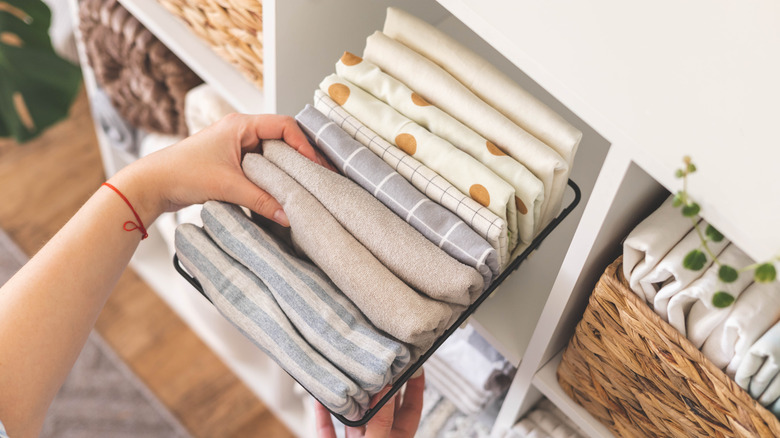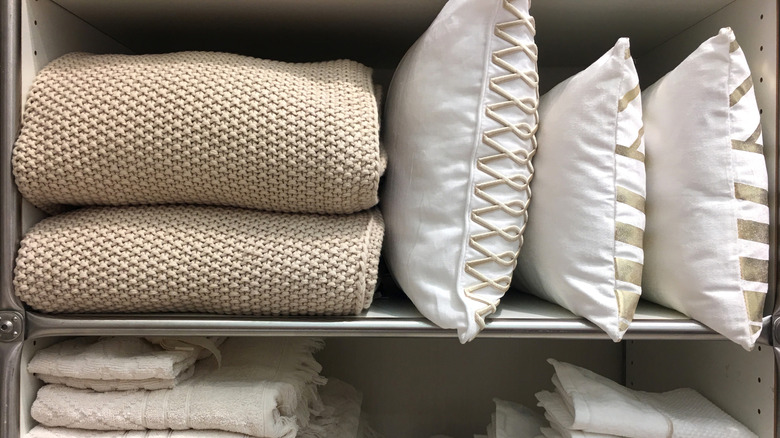The Amount Of Linens You Should Really Have In Your Linen Closet
Knowing the correct amount of linens to have in your linen closet might seem like useless information, but it's actually very practical. After all, having too few linens like sheets, towels, and blankets can leave you in a bind, but having too many can lead to a cramped closet with no room to spare. So, how many linens are enough? While the exact number can depend on your household, most agree that having one or two sets of current-season sheets for each bed in your closet is sufficient, with one or two sets of off-season also stored for each bed. For towels, you'll want to make room for two full sets per person, plus extra for guests. If you live somewhere cold, consider keeping one extra blanket per bed in your linen closet, and at least one extra pillow for each guest bed.
Closet space plays a huge part in how many linens you can store. There are tips for making the most out of your small linen closet to maximize storage and keep everything organized. For an easier way to keep your sheets tidy, fold your fitted sheet like a pro and tuck that, along with your flat sheet, into the pillowcase. Also, be sure to keep all sets of towels neatly folded together so they are ready to be used when needed.
If you are low on space, you can keep fewer items in your linen closet. Conversely, if you have severe allergies or use a laundromat, you may want to consider stocking up on extras. Ultimately, it's up to personal preference and overall budget, but having a starting point is always beneficial.
What sheets to keep
If you live in a climate where there are dramatic seasonal changes, like from a hot summer to a frigid winter, you might find it best to keep different seasonal sheets. This could mean flannel sheets for colder nights and percale cotton sheets for hot summer nights. To keep everything organized and in one place, it's best to keep all of your sheets — the current season ones and off-season ones — in the same closet. This rule of thumb applies regardless of how big your household is, so that you always know exactly where to find the linens you need, when you need them, without having to search the whole house.
When considering the amount of linens to keep, it is also good to think about the quality of the sheets you have stored in your closet. Ideally, you'll want linens that are in good condition, meaning not full of holes or lingering odors. Sure, no such thing as the linen police exists, so you won't get a citation for mismatched top and fitted sheets. However, it is best practice to store complete sets for both aesthetic and practical purposes. You wouldn't want to go looking for new sheets and only find a top sheet, or have to make your bed with mismatched pillowcases, for example.
What other linens to keep
Beyond sheets, you'll need to keep the proper number of other linens in your linen closet so that you always have some on hand. Most households prefer to keep towels in the linen closet so they are easily accessible. Ideally, you should keep two full sets of towels — bath towel, hand towel, and washcloth — per person in your house, with one set always available for use in the linen closet. However, if you frequently have overnight company, it's best to keep an additional two full sets of towels in the linen closet for use.
Other linens you'll likely find in your linen closet include blankets, table linens, and spare pillows. For blankets, it's smart to keep one extra blanket for every bed in the house. This can be helpful on cold nights or if your current blanket finds its way into the laundry pile. If you use table linens for special occasions only, you can get away with keeping one single tablecloth and a set of 12 fabric napkins tucked away in your linen closet. As far as pillows go, having one to two extra pillows per guest bed is ideal.
If you find that you have excess linens or ones that have seen better days, there are a few ways to dispose of them that will keep them out of landfills. You can donate used linens to a local animal shelter — they use these to provide bedding and comfort for the animals, so they won't mind them being used. If they are in particularly decent condition, consider donating to a nearby homeless shelter, church, or thrift store.


